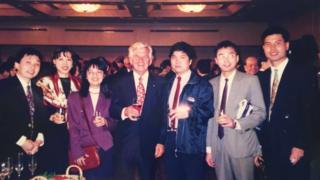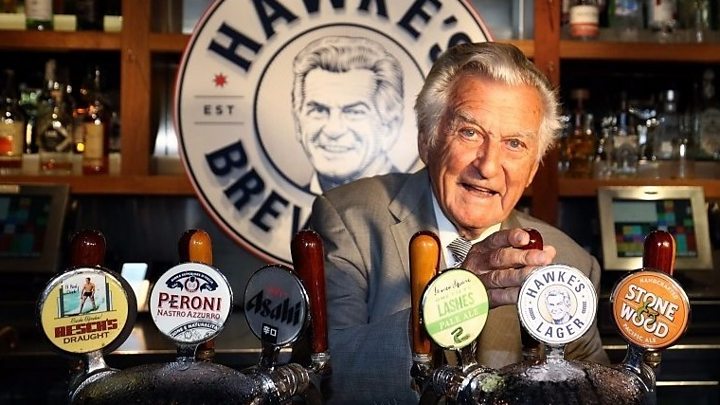Home » Australasia »
The PM’s call that ‘changed the face of Australia’
On Friday, Australians will honour beloved former leader Bob Hawke in a memorial service at the Sydney Opera House. Among them will be many Chinese Australians – including my parents – whose lives changed forever when Mr Hawke offered them asylum after the Tiananmen Square massacre.
In June 1989, Chinese troops used guns and tanks to suppress protesters calling for democracy in Beijing, killing an unknown number of people.
Half a world away in Australia, my father Cong Hui Mao watched in horror as the crackdown unfolded on his television set.
He had recently moved to Sydney, aged 30, on a one-year student visa. In Australia he found a vast nation with the kind of political freedoms that protesters in China had been calling for. The Tiananmen demonstrations had given him hope, and for weeks he closely followed the “promising flickers” of a new China.
“It was an exciting time – we felt that we were at a crossroads where we could bring up new ideas,” he says.
“So when Tiananmen happened, it was like a great fire had been quashed.”
In the days following, he joined crowds of Chinese students in Sydney who poured on to the streets to march for their peers at home. “We were grieving but also angry,” he says. “So angry at our government who had attacked its own people.”
The images from Beijing horrified the world, including then-Prime Minister Bob Hawke. At a national vigil in Canberra, he cried openly while reading out graphic details from a diplomatic cable: “When all those who had not managed to get away were either dead or wounded, foot soldiers went through the square, bayonetting or shooting anybody who was still alive.
“Tanks then ran backwards and forwards over the bodies of the slain, until they were reduced to pulp.”
Immediately afterwards, Mr Hawke granted visa extensions to all Chinese students in Australia.
Mr Hawke later confirmed that he did not consult his cabinet before announcing the decision. He told The Guardian in 2015: “I have a deep love for the Chinese people… when I walked off the dais I was told: ‘You cannot do that, prime minister.’ I said to them: ‘I just did. It is done.'”
‘Everyone felt grateful’
Ultimately, about 42,000 Chinese people took up the offer and forged new lives in Australia. They were given working rights and social support, and later their temporary visas were made permanent.
“Everyone felt so grateful to Hawke for his decision to allow us to stay,” says my father, who met Mr Hawke on numerous occasions at Chinese community functions held in the politician’s honour. “If he hadn’t said that, many of us would have returned to China where we feared it was unsafe, and where we feared China would go backwards.”
My mother, Ying Zhu Wang, flew to Australia in 1990 on a student visa. In Sydney, my parents met and married, set up a home and had their first two children. They didn’t return to visit China until five years after the massacre.
When Mr Hawke died on 15 May, my parents – like many Chinese Australians – contacted their friends and reminisced. Many will join other Australians at Friday’s state memorial service.
One poem by local resident Zhou Weiqiang has been shared widely among Chinese Australians on social media platform WeChat.
It translates to: “The iron man is tender-hearted, tears welling up in public. Judge the situation and make a general pardon. 40,000 children to help Australia prosper. Think of Hawke, we will see you around.”
There is also much gratitude towards Mr Hawke for his attitude towards China after the Tiananmen Square protests. “He had good relations with China and its development. He understood us,” my mother says.
Jia Lu, a Chinese interpreter and researcher at the University of New South Wales, agrees: “Of course, we are thankful to him for his action after Tiananmen and the visas that allowed us to bring our families over. But people forget too that he was an Australian politician – a rare politician who kept a positive view of China’s development.”
She estimates that he attended more than 100 events held by community groups over the years.
“He was a real friend to the Chinese. For me and so many of my friends, we will really miss him.”
Transforming Australia
Mr Hawke felt the disappointment of Tiananmen deeply because he had been engaging directly with a newly West-looking China, says historian Prof Frank Bongiorno of the Australian National University.
“It’s almost beyond inconceivable today for a prime minister to make a unilateral and radical decision like Hawke did,” he says. “And he wanted to show Australia as a generous and compassionate society.”
The decision drew resistance from some officials and ministers who feared it could overwhelm Australia’s migration programme, or lead to resentment among other communities.
But it ended up “transforming the face of Australian multiculturalism”, says Dr Christina Ho, a migration expert at the University of Technology.
“They were a particular group – young, students who then went on to be educated, professional people who have made a huge contribution to Australian society.”
Not that it was an easy integration. During the 1980s and 1990s, there was ongoing political debate about the rate of Asian immigration and social cohesion. Many migrants were highly educated but had a poor grasp of English and struggled to find well-paying jobs, says Prof Ho.
“A lot of de-skilling happened in that generation,” she says. “But still, they worked hard, integrated into Australian society and raised their own families. Now they’re part of the vibrant multicultural society that is Australia today.”
This diaspora also became a cultural asset as Australia expanded its trade relationship with China in the 1990s, says Prof Bongiorno.
“You had a significant group of Chinese Australians who were a real resource,” he says. “They had the linguistic skills and native sense of the cultural dynamism of Chinese society.”
He cites the post-Tiananmen Square intake and Vietnamese migration in the 1970s as two critical points in steering Australia more towards Asia as a society.
Those Chinese students provided support for the next stream of Chinese migrants – largely middle class and from the mainland – who have moved to Australia in the past decade. Asia now accounts for more than half of Australia’s migration intake.
“Back in 1989, after Tiananmen, we were all scared – China was a closed door,” says my father.
“Bob Hawke – he showed kindness to us students. He gave us opportunity. Although he’s died, we still think of him in our hearts and remember him.”
Source: Read Full Article




